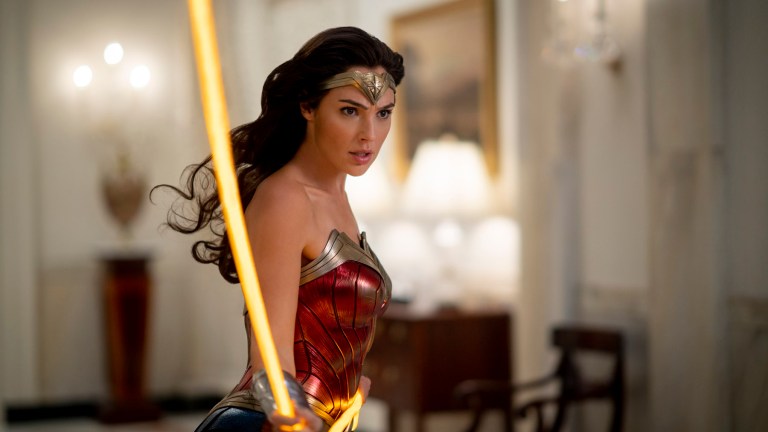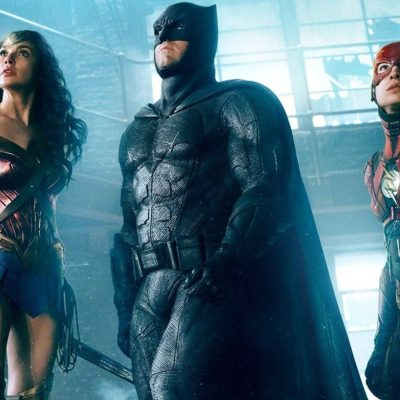Wonder Woman 1984: Does HBO Max Premiere End Theatrical Releases as We Know Them?
Warner Bros. making the stark choice to put Wonder Woman 1984 on HBO Max the same day it premieres in theaters has major ramifications for the industry.

What once seemed unthinkable has happened. Warner Bros. decided to put a superhero movie, and what is the studio’s highest profile 2020 release, directly on streaming. Wonder Woman 1984 is going to HBO Max the same day it opens in theaters. And like that, the Hollywood movie industry as we know it has changed.
Confirmation of the shift came from director Patty Jenkins, who verified the news via social media after rumors of an HBO Max debut for Wonder Woman 1984 began to leak.
“THE TIME HAS COME,” Jenkins began. “At some point you have to share any love and joy you have to give, over everything else. We love our movie as we love our fans, so we truly hope our film brings a little bit of joy and reprieve to all of you this holiday season.” Jenkins goes on to say that audiences should seek out the movie in a theater if they live in areas where it is “made safe” to do so. But it likely will be a relatively small audience that takes such a risk with the film available to stream safely at home on Christmas Day.
The move is in stark contrast to what Jenkins and Warner Bros. have been saying for months, with WB being the only studio to release a major blockbuster in theaters after the COVID-19 pandemic effectively shut down cinemas. Of course that may have precipitated this eventual move.
“It’s so great to be on the big screen,” Jenkins said as recently as August. “So we’re going to stick it out. We believe in putting it in the cinema.”
A lot has changed since then, but arguably the biggest factor was WB’s own Tenet. Positioned by writer-director Christopher Nolan and his studio as the film that was going to save cinemas, the film had a notoriously soft opening in the U.S. in early September and went on to only gross $56.3 million in North America as of the time of writing. While that number doesn’t take into account that three of the biggest moviegoing markets in the U.S. have remained closed during its entire run—New York City, Los Angeles, and San Francisco—the fact they are closed highlights the problem.
WB made the choice less than a week after Tenet’s opening to move Wonder Woman 1984 from an Oct. 2 opening to Dec. 25. But that was already the film’s third delay, with the picture previously scheduled to premiere in June and then August.
Obviously the intensifying nature of the pandemic has caused every prudent delay, and with all signs pointing to an extremely grim winter, releasing Wonder Woman 1984 worldwide in December looked evermore untenable, at least if Warners wanted to turn a healthy profit.
So what’s startling isn’t that WB felt compelled to adjust course yet again; it’s that the studio which once positioned itself as the savior of movie theaters is now the one to turn the cracks in the theatrical window into a gaping hole.
WarnerMedia CEO Jason Kilar seemed to acknowledged the paradigm-shifting significance of the move in his own statement this evening. While he listed a “belief in the theatrical experience” and exhibitors as one of the major factors in WB’s decision-making, he also said the following:
“I find it fascinating that we will be measuring the performance of this movie in an entirely new way. To use a line from The Wizard of Oz, we’re not in Kansas anymore. While we will pay attention to theatrical revenues, our expectations are clearly adjusted due to COVID-19. In parallel, we will be paying close attention to the numbers of families and fans diving into HBO Max, as we certainly anticipate that a portion of fans will choose to enjoy Wonder Woman 1984 that way on opening day and beyond.”
– WarnerMedia CEO Jason Kilar
Kilar of course noted that WB remains committed to the theatrical experience and that they will work alongside exhibitors to serve moviegoing for “as long as fans seek out the theatrical experience.” However, the writing is on the wall that this is the first trip to Oz for WB, not the last, and that they’re going to be measuring the success of Wonder Woman 1984 by how much it drives up viewership on HBO Max. Kilar even seemed to set a goalpost for the superhero epic by noting that an estimated four million people saw the first Wonder Woman in theaters on opening day in 2017. WarnerMedia now wonders “is it possible” to see similar numbers between theaters and HBO Max on Dec. 25?
There are of course other would-be blockbusters that broke the theatrical window over the last eight months. Universal Pictures broke it first by putting Trolls World Tour on PVOD in April. That move led to significant animosity between the studio and the largest movie theater chain in North America, AMC Theatres, with the two eventually making nice and creating what seemed like a history-making deal to pare the theatrical window to as little as 17 days.
Elsewhere Disney elected to put Mulan on Disney+ for an additional (and luxurious) premium of $30; the corporation has since announced Pixar’s next film, Soul, will premiere on Disney+ without a premium… also on Christmas Day.
However, none of those films were considered decisive focal points for their studio’s entire fiscal year. Disney certainly had high hopes for Mulan, which might have grossed $1 billion. Hence the pricy experiment of a $30 paywall attached to the film’s Disney+ premiere. Yet the Mouse House moved its superhero content for 2020, Black Widow and Eternals, to 2021. Universal similarly moved F9 a full year into May 2021 while the distributor and its No Time to Die partners at MGM continue to push the next James Bond movie down the calendar.
But even before the pandemic, Wonder Woman 1984 was always WB’s biggest release of 2020. While the company undoubtedly had high hopes for a new original science fiction epic from Christopher Nolan, whose last two original forays into the genre earned $837 million and $696 million worldwide, respectively, Wonder Woman 1984 was WB’s summer centerpiece that followed up on one of the leggiest box office runs of the last decade. The first Wonder Woman increased its domestic box office by fourfold after its opening weekend. That’s a multiplier which is virtually unheard of in the 21st century.
A highly marketed sequel to that film was almost certainly earmarked to have $1 billion global expectations. The pandemic obviously put such hopes to an end, but the move to mostly abandon theater exhibitors on a superhero movie is unprecedented. And, notably, nowhere in Kilar’s statement did he suggest this is a one-off.
More major blockbusters will follow Wonder Woman’s example, the only question is which. All eyes are obviously shifting to how Disney will handle the release of their next Marvel Studios effort, Black Widow. The film has similarly been delayed multiple times due to the pandemic and is now slated to bow in May 2021. However, Disney CEO Bob Chapek said just last week that the studio was pleased with Mulan’s Disney+ PVOD rollout. He went on to add, “We saw [enough] positive results to know that we had something in the premiere access strategy.”
It is reasonable to speculate that both WB and Disney are the best equipped to transition to a model that either completely skips theaters or uses a “day and date” theatrical/streaming release for their blockbusters. With Disney+ becoming one of the most popular streaming services in Western markets, and Warners’ HBO Max building off the already strong reputation (and HBO Now infrastructure) cultivated by premium cable network HBO, the two have stronger foundations in place to experiment like they have been with Mulan and now Wonder Woman 1984.
It’s also worth noting, however, that HBO Max may wish to drive up subscriptions more aggressively, which might be one reason the streamer is not adding a premium to Wonder Woman like Disney did with Mulan.
Meanwhile Universal Pictures and Paramount are also entering the streaming realm, with Universal’s Peacock recently launching and Paramount preparing to rebrand CBS All Access as something more recognizable as a Paramount-wide service. However, neither has the subscription base of Disney or even HBO Max. One could speculate if putting the next Fast and Furious on Peacock might drive up subscriptions, but the service doesn’t seem quite ubiquitous enough yet to fully make up for the loss of international revenue associated with that franchise.
Sony Pictures and Lionsgate, meanwhile, have no streaming services. Presumably this could lead those studios, and Universal and Paramount as well, to explore more traditional PVOD strategies through partnerships with third parties, similar to the one Universal mapped out with AMC Theatres, but that is really an unknown in the present.
Nevertheless, Wonder Woman 1984 has crossed the Rubicon, and in doing so it signals they’re all headed this way in the long run. Once again Diana is the first to go where no man, or superhero movie, has dared travel before. She will not be the last.


